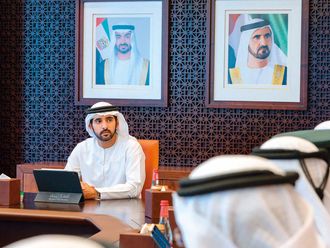Sharjah: A forum taking place in Sharjah aims to lay the groundwork for making 2018 a “watershed year” in the fight against Non-Communicable Diseases (NCDs), billed as the “world’s biggest killers”.
The Second Global NCD Alliance Forum, that began on Saturday, is galvanising international efforts ahead of the third high-level meeting on NCDs at the UN General Assembly next year.
In his opening remarks to the forum on Saturday, His Highness Dr Shaikh Sultan Bin Mohammad Al Qasimi, Member of the Supreme Council and Ruler of Sharjah, said cancer is one of the most dangerous and complex types of NCDs, responsible for 15 million deaths worldwide.
He noted that among the leading causes of cancer were smoking, alcohol and obesity — all of which Sharjah has been taking positive steps to curb.
Dr Shaikh Sultan said: “We have implemented a ban on smoking in many public places, which has led to a decrease in deaths due to smoking. And for 32 years, Sharjah has once again taken the lead in the prohibition of alcohol — which is responsible for 10 per cent of all cancer deaths — in the emirate. As for obesity, Sharjah has forged ahead, supplying walkways in many locations so that people can go walking and jogging and lead a healthier lifestyle. We will also have one of the best air-conditioned walkways where, even during the five hot months of the year, people can still exercise.”
Speaking of the forum itself, he said it is more than an event, describing it is a catalyst for change. The first forum was held in Sharjah in 2015.
“People thought that this forum may be an event where speeches are given and plans are made, then everything is forgotten — this is not the case. This is a place of practical action. It is a credit to you all that you have stimulated us to take action and initiate many projects.
“We will continue to take action — it is a responsibility and you are our guiding light. Future results will be even better. We will implement your recommendations and we thank you for your guidance. We are here to support you and will fulfil our promise that you will see the results of your guidance when we meet here next year.”
In 2018, the UN General Assembly is staging the third high-level meeting on the prevention and control of NCDs. On Saturday, delegates said the Sharjah forum could be instrumental in making 2018 a “watershed” year in combating NCDs.
The forum is held under the directive and patronage of Shaikha Jawahar Bint Mohammad Al Qasimi, wife of Dr Shaikh Sultan and Founder and Royal Patron of the Friends of Cancer Patients (FoCP), International Ambassador for the World Cancer Declaration of the Union for International Cancer Control (UICC), International Ambassador for Childhood Cancer for UICC and Patron of Global NCD Alliance Forum.
More than 350 delegates and 80 speakers from 68 countries are participating at the forum.
Sawsan Jafar, chairperson of FoCP, said: “Today’s convention is a significant stride towards perpetuating the achievements of the first forum held in Sharjah in 2015, which culminated in the ‘Sharjah Declaration for Non-Communicable Diseases’, emphasising the importance of supporting the UN’s Sustainable Development Agenda for 2030.”
José Luis Castro, president of the NCD Alliance, said NCDS are the “global health tsunami of the 21st century. These diseases and conditions are devastating communities, crippling health systems, and thwarting economies, through widespread sickness, disability, and untimely and often avoidable deaths. No country is immune, and no country has this tidal wave under control”.
The NCDs kill around 40 million people worldwide every year.
Chair of Saturday’s closing panel, Sir George Alleyne, board member of the NCD Alliance, told the delegates, “This is not just about future years, this about 2018 — we are just not running fast enough. I don’t want to be pessimistic, I want to see our strengths and see how we can catch up and get to the pace we need to be … We need to make sure 2018 is a watershed year for tackling NCDs.”
As part of her keynote speech, Dr Sania Nishtar, chair of WHO High-Level Commission on NCDs-Pakistan, said: “The UAE is at the forefront of change and innovation and we have a chance through the fourth industrial revolution to join the dots, but we will need new experts, new thinking, new regulations and new human resources.
“But let us remember that we have come a long way; governments have committed to change, Heads of State have committed. The civil society plays the role of a moral compass, but you are the ones who will put the wind into the sails of the high-level summit and progress.”












